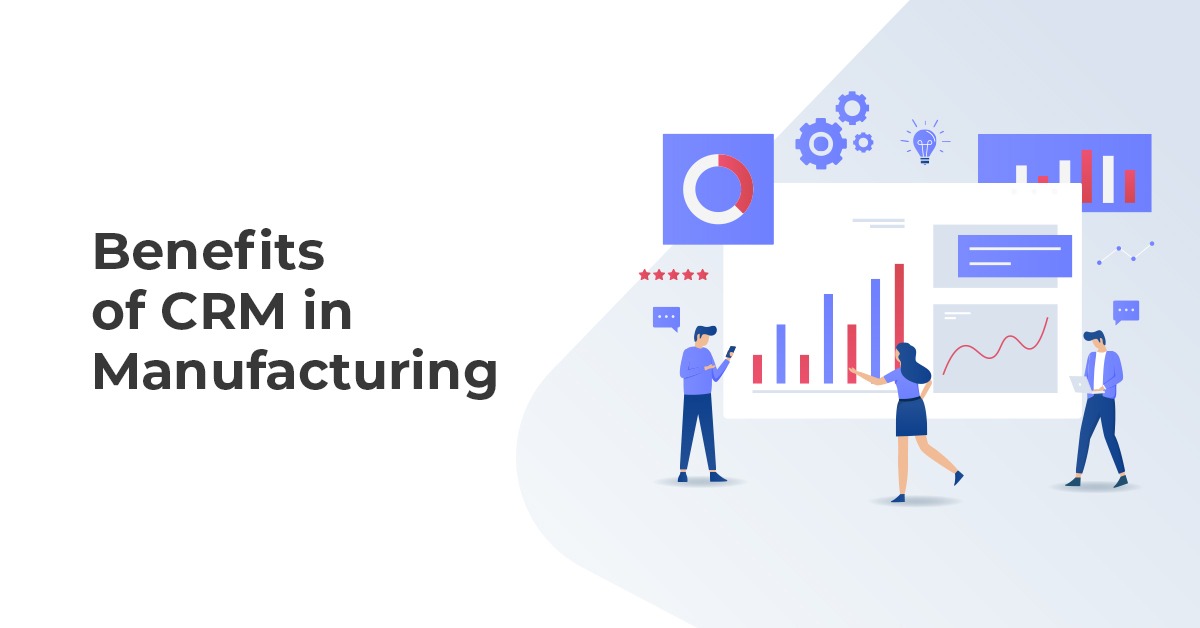Benefits of CRM in Manufacturing

The global manufacturing industry is a powerful force on its own. In the US alone, it accounts for 11% of the country’s overall GDP and contributes at least $2.74 for every dollar spent in the industry to the economy.
But the manufacturing industry is bound to undergo change and transformation. Recent advances in technology and the development of software such as CRM have reshaped the way manufacturing companies interact with their clients.
Most companies in the industry are B2B oriented, meaning they transact with large businesses and clients that could contribute hundreds of thousands, if not millions, to the company per transaction. This is why developing good relationships with these clients is imperative and should be a priority for every manufacturing company.
What is CRM?
This is where CRM comes into play. Customer Relationship Management (CRM) is an approach to business that aims to develop good business relationships with customers over time. This includes the collection of data from customers to create personalized services and creating a strategy that helps the company achieve efficiency throughout its sales and marketing processes.
Today, CRM is heavily integrated with software development. CRM software (or simply CRM) is a huge market globally. In 2020 alone, the market is estimated to be worth $52.64billion and is used for purposes such as Marketing and Sales Automation, Customer Management, Lead Generation, Customer Retention, and Customer Support.
What is CRM in manufacturing?
Manufacturing CRMs are software designed for manufacturing businesses. It has tools and features that allow these companies to create records about customers and include details such as addresses, phone numbers, and needs and preferences. Sales reps can then use this information to create a customer persona, gain a deeper understanding of their customers, identify sales opportunities, and close deals more quickly.
CRM Manufacturing Stats
Stats for the manufacturing industry:
In the US alone, the manufacturing industry employs around 8.51% of the workforce.
Manufacturing companies account for 13% of CRM users, according to SelectHub.
Users in the manufacturing industry are estimated to contribute at least $3.7 billion to the CRM industry by 2021.
In North America, the CRM industry for manufacturing companies is forecast to reach $2.35 billion by 2027.
Benefits of CRM in Manufacturing
Among the benefits of CRM in the manufacturing industry are:
Generation of Leads
Qualifying Leads
Closing Deals Fast
Driving Sales Growth
Improving Customer Retention
Generation of Leads
One of the ways manufacturing companies can increase their sales is through generating leads online. Websites of manufacturing companies should prompt visitors to fill out a form that would collect their contact details such as names and email addresses so that they can reach out to them anytime whenever new products are launched.
This would keep leads in your sales pipelines and improve your chances of converting them into customers, therefore increasing your sales.
CRMs like Saphyte allow users to create landing pages that would prompt website visitors to fill out a form. The details will then be migrated into the CRM database which users can use to monitor and track their leads.
Qualifying Leads
When manufacturing companies are able to collect information about their prospective customers well, they will be able to determine their needs, preferences, and requirements, which allows them to engage them better.
CRMs allow users to create notes about their prospective customers, assign them to proper salespersons, and create a feedback loop mechanism that allows manufacturing companies to further personalize their services. Better services result in better chances of lead conversion.
Closing Deals Fast
With the use of smart lead tracking systems available in CRMs, sales teams can quickly provide the right service to each lead, allowing these leads to get their needs catered to as soon as possible. This helps sales teams close deals fast.
They get prompted whenever it’s the right time to send a message, to follow-up, or to schedule a meeting. This knowledge on when to follow up on high-quality, sales-ready leads increases the chance of closing deals fast.
Driving Sales Growth
When the manufacturing company’s lead generation system is effortless and prospective customers are engaged well, chances of lead conversion are high as well as repeat purchases. These ultimately drive sales growth to the manufacturing company.
These can all be done using automation features such as drip marketing and other tools and functions built in the CRM. Overall, these allow manufacturing companies to do more, sales-wise, even with fewer resources.
Improving Customer Retention
When customers experience better services— those that quickly address their needs and preferences— they are more likely to stay with the company and purchase from them in the future. This is called customer retention and most companies attribute 80% of their sales to this aspect.
Also, take note that it’s cheaper to make customers stay than to actively look for new ones.
Conclusion
There are a lot of benefits of CRM in manufacturing. With the way the economy works now, it is important to stay updated with technological trends and hijack the opportunities they create.
Start Your Automotive CRM Journey With Us
Looking to enhance your service as an automotive company and impress your customers? Check out how our CRM can help you gain an edge over your competitors. Get started here.
Book a Demo